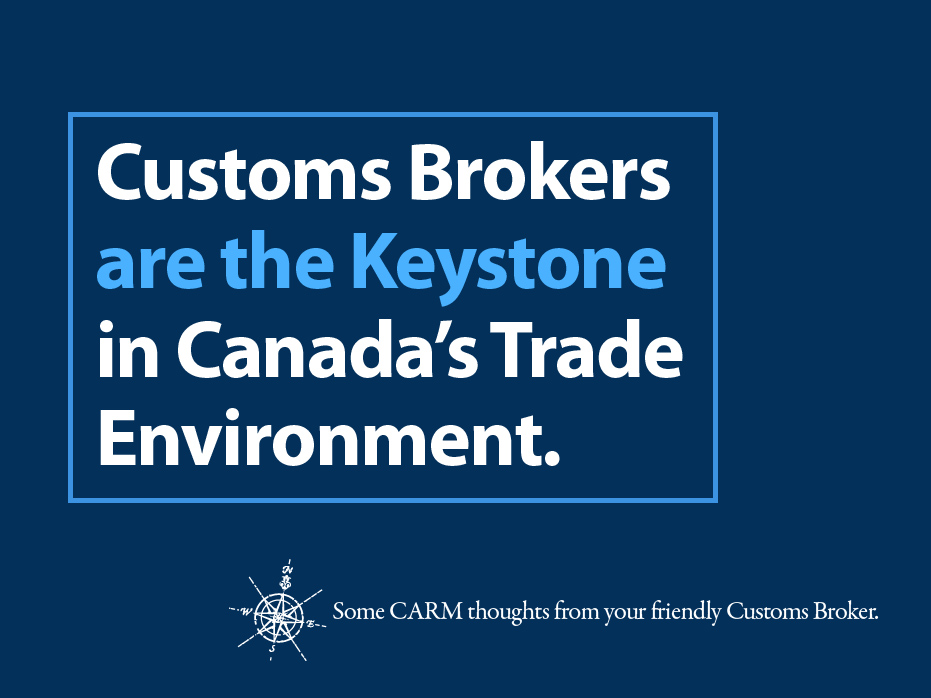
CARM thoughts from your friendly Customs Broker.So we are now three months into the new CARM environment and while progress is slowly being made, there remain innumerable challenges and obstacles to a successful implementation.
CARM R3 was not in a functional state to be launched last October, but the voices of reason from almost all corners of the importing community were superseded by the CBSA’s self-imposed mandate to roll out the new system of record.
Numerous temporary measures have had to be recognized by the agency to cope with the system’s shortcomings such as a waiver of late accounting penalties, the ability for brokers to continue to use their business numbers for clearances, and a delay to release prior to payment requirements. These are just some of the work arounds that exist today to allow the customs clearance process to continue, and there is a definite possibility that they will remain in place for the medium term.
Along with the new system of record came expanded data requirements for other government departments to be included in the Commercial Accounting Document, or CAD, submitted by importers and brokers.
Many of these new data elements were not sufficiently communicated to the brokerage community prior to the release of CARM, and brokers have been playing catch up to ensure the correct information is being collected and transmitted to CBSA and related government agencies.
More than ever before, Customs Brokers are tasked with collecting and remitting data for all government agencies such as Health Canada, Global Affairs, NRCan, CFIA, Transport Canada, Environment Canada, etc.
Brokers are the de facto front-line troops, working as unpaid employees for these agencies protecting Canadians and ensuring governmental regulations are being met. The scope and breadth of knowledge that Customs Brokers must acquire is incredible. Add to this, ever-changing laws and regulations and the need for continuing training and education at the brokers’ expense, and it becomes crystal clear just how indispensable the role of the Customs Broker has become.
One of the initial goals of CARM was to create a system where individual importers could manage their own import accounts and submit accurate declarations. One could now argue that the CBSA has created the opposite of this with importers, for the most part, confused and simply unable to comprehend the requirements behind submitting a customs declaration.
A majority of CBSA front line staff have not received adequate training on the new system, and are unable to assist importers at the border; without Customs Brokers, trade would be severely compromised or worse.
Simply put, Customs Brokers are the keystone in Canada’s trade environment. While perhaps underestimated by CBSA and other government agencies, without Customs Brokers, cross border trade as we know it would grind to a screeching halt.
Thankfully, commercial and casual importers alike recognize the singular importance of their Customs Broker, and we in turn thank you.
So we are now three months into the new CARM environment and while progress is slowly being made, there remain innumerable challenges and obstacles to a successful implementation.
CARM R3 was not in a functional state to be launched last October, but the voices of reason from almost all corners of the importing community were superseded by the CBSA’s self-imposed mandate to roll out the new system of record.
Numerous temporary measures have had to be recognized by the agency to cope with the system’s shortcomings such as a waiver of late accounting penalties, the ability for brokers to continue to use their business numbers for clearances, and a delay to release prior to payment requirements. These are just some of the work arounds that exist today to allow the customs clearance process to continue, and there is a definite possibility that they will remain in place for the medium term.
Along with the new system of record came expanded data requirements for other government departments to be included in the Commercial Accounting Document, or CAD, submitted by importers and brokers.
Many of these new data elements were not sufficiently communicated to the brokerage community prior to the release of CARM, and brokers have been playing catch up to ensure the correct information is being collected and transmitted to CBSA and related government agencies.
More than ever before, Customs Brokers are tasked with collecting and remitting data for all government agencies such as Health Canada, Global Affairs, NRCan, CFIA, Transport Canada, Environment Canada, etc.
Brokers are the de facto front-line troops, working as unpaid employees for these agencies protecting Canadians and ensuring governmental regulations are being met. The scope and breadth of knowledge that Customs Brokers must acquire is incredible. Add to this, ever-changing laws and regulations and the need for continuing training and education at the brokers’ expense, and it becomes crystal clear just how indispensable the role of the Customs Broker has become.
One of the initial goals of CARM was to create a system where individual importers could manage their own import accounts and submit accurate declarations. One could now argue that the CBSA has created the opposite of this with importers, for the most part, confused and simply unable to comprehend the requirements behind submitting a customs declaration.
A majority of CBSA front line staff have not received adequate training on the new system, and are unable to assist importers at the border; without Customs Brokers, trade would be severely compromised or worse.
Simply put, Customs Brokers are the keystone in Canada’s trade environment. While perhaps underestimated by CBSA and other government agencies, without Customs Brokers, cross border trade as we know it would grind to a screeching halt.
Thankfully, commercial and casual importers alike recognize the singular importance of their Customs Broker, and we in turn thank you.



